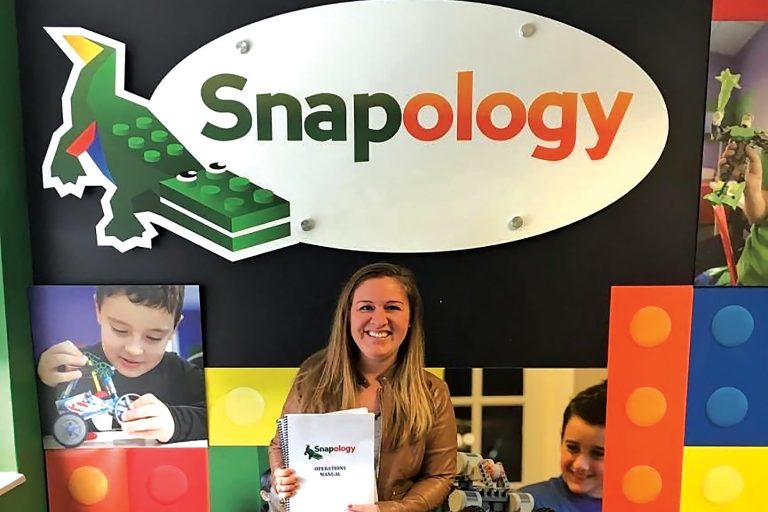
Kayla Opperman made good money at her engineering job. But when her daughter was a baby, she got tired of long hours in the office. She also recognized there was a limit to how much she could make working for someone else. “I’d worked hard to get an engineering degree,” she says, “so I didn’t want to let that go completely. But I started researching if there were any franchises that involved engineering. And that’s when I came across Snapology.”
Snapology is a kids’ STEM and robotics brand founded in 2010, and now has 130 locations around the country. But in 2018, there were no locations in Colorado, where Opperman lived, and she viewed that as a big opportunity. When she visited headquarters, she loved how happy everyone seemed, so she went for it. Six years later, she and her husband own five units, as well as one with Class 101, a college-planning franchise. Here, she talks about scaling strategies, working with your spouse, and the importance of friendships with other franchisees.
Related: She Cashed in $100K of Her Retirement Savings to Start a Business. Here’s What Happened.
You scaled to five units pretty quickly. What was that like?
Snapology has proven to be a good choice for a lot of reasons, but especially the scaling part. At first, we were kind of living off my husband’s paycheck and I was reinvesting in the business to expand more. I was in the green with my first franchise 10 months in, so bought my second franchise a year later. I bought three more units a couple of years after that, which made sense because I’d gotten to know my market and customer base, and I knew I wanted those other territories.
How did you and your husband make the decision to work together?
It just started to make sense. When COVID happened, he started working remotely, so he got roped into my business stuff. After a while he was working full time at Snapology, and full time at his engineering job, and also taking care of two kids. So it was like, something’s gotta give. He quit maybe eight months after I bought those additional units, and it’s been great. We don’t really have a work-life balance, more like work-life integration. But that works for us. We’ll go out on a date and talk a lot about business, but that’s because we like talking about it.
Snapology was acquired by Unleashed Brands after you joined. How’s that been for you?
To me, it meant more resources. I genuinely love and care about Laura Coe, the founder and now-former CEO of Snapology, but I knew she needed a smart exit plan, like any strong business owner would. Of course, selfishly, I was sad, but it all made sense to me. I was just excited to have more smart people around me and more resources.
What are your plans for continued growth?
Well, we’re pretty maxed out on our territory with Snapology. I also feel like it’d be hard to own a Snapology remotely. I’m from the Chicago area, so I thought about opening one in my hometown, but I just don’t think it’s possible. But Class 101 focuses on high schoolers. At Snapology, I’m working with elementary-age kids, and eventually they’ll be the age for Class 101. So I would love to have Class 101 all over my Snapology territory.
Do you have advice for other prospective franchisees?
Talk to other franchisees. We rely on each other for ideas, and you form a special bond when you train together. They’re my best friends now. The other thing is, when you buy a franchise, I think you need to make it your full-time commitment. When people buy a franchise while they’re still working another job, they’re so slow building it that they end up failing, because you do have to pay royalties. So I tell anyone thinking about it: You need to be all about it.
Related: The Role and Responsibilities of a Franchisee, Defined